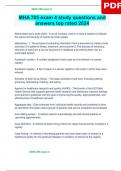MHA 705 exam 4
MHA 705 exam 4 study questions and
answers top rated 2024
Abbreviated injury scale (AIS) - A set of numbers used in a trauma registry to indicate
the nature and severity of injuries by body system
abstracting - 1. The process of extracting information from a document to create a brief
summary of a patient's illness, treatment, and outcome 2. The process of extracting
elements of data from a source document or database and entering them into an
automated system
Accession number - A number assigned to each case as it is entered in a cancer
registry
Accession registry - A list of cases in a cancer registry in the order in which they were
entered
Activities of daily living (ADLs) - The basic activities of self-care, including bathing,
grooming, ambulating, toileting, and eating
Agency for healthcare research and quality (AHRQ) - The branch of the US Public
Health Service that supports general health research and distributes research findings
and treatment guidelines with the goal of improving the quality, appropriateness, and
effectiveness of healthcare services
Aggregate data - Data extracted from individual health records and combined to form
de-identified information about groups of patients that can be compared and analyzed
Auto dialing system - A method used to automatically call and remind patients of
upcoming appointments
Case definition - A method of determining criteria for cases that should be included in a
registry
Case finding - A method of identifying patients who have been seen or treated in a
healthcare facility for the particular disease or condition of interest to the registry
MHA 705 exam 4
, MHA 705 exam 4
Claim - An itemized statement of healthcare services and their costs provided by a
hospital, physican office, or other healthcare provider; submitted for reimbursement to
the healthcare insurance plan by either the insured party or the provider
Clinical trial - A controlled research study involving human subjects that is designed to
evaluate prospectively the safety and effectiveness of new drugs, tests, devices, or
interventions
Collaborative stage data set - A new standardized neoplasm-staging system developed
by the American Joint Commission on Cancer
Computer virus - a software program that attacks computer systems and sometimes
damages or destroys files
Credentialing - The process of reviewing and validating the qualifications (degrees,
licenses, and other credentials) of physicians and other licensed independent
practitioners, for granting medical staff membership to provide patient care services
Data confidentiality - The extent to which personal health information is kept private
Data dictionary - A descriptive list of the data elements to be collected in an information
system or database whose purpose is to ensure consistency of terminology
Data security - The process of keeping data, both in transit and at rest, safe from
unauthorized access, alteration, or destruction
Database - An organized collection of data, text, references, or pictures in a
standardized format, typically stored in a computer system for multiple applications
Deidentification - The process in which users of secondary data will need to remove
identifying data so that data can be used without violating the patient's privacy
Demographic information - Information used to identify an individual, such as name,
address, gender, age, and other information linked to a specific person
Disease index - A list of diseases and conditions of patients sequenced according to the
code numbers of the classification system in use
Disease registry - A centralized collection of data used to improve the quality of care
and measure the effectiveness of a particular aspect of healthcare delivery
MHA 705 exam 4
, MHA 705 exam 4
Edit - A condition that must be satisfied before a computer system can accept data
Encryption - The process of transforming text into an unintelligible string of characters
that can be transmitted via communications media with a high degree of security and
then decrypted when it reaches a secure destination
Facility based registry - A registry that includes only cases from a particular type of
healthcare facility, such as a hospital or clinic
Food and drug administration (FDA) - The federal agency responsible for controlling the
sale and use of pharmaceuticals, biological products, medical devices, food, cosmetics,
and products that emit radiation, including the licensing of medications for human use
Health services research - Research conducted on the subject of healthcare delivery
that examines organizational structures and systems as well as the effectiveness and
efficiency of healthcare services
Healthcare cost and utilization project (HCUP) - A group of healthcare databases and
related software tools developed through collaboration by the federal government, state
governments, and industry to create a national information resource for patient-level
healthcare data
Healthcare integrity and protection data bank (HIPDB) - A national database that
collects information on cases of healthcare fraud and abuse
Histocompatibility - The immunologic similarity between an organ donor and a
transplant recipient
Incidence - The number or rate of new cases of a specific disease
Index - An organized (usually alphabetical) list of specific data that serves to guide,
indicate, or otherwise facilitate reference to the data
Injury severity score (ISS) - An overall severity measurement maintained in the trauma
registry and calculated from the abbreviated injury scores for the three most severe
injuries of each patient
Interpreter reliability - Not in glossary
MHA 705 exam 4




